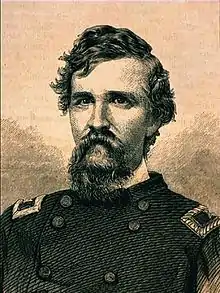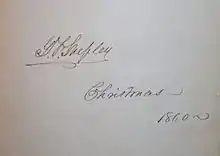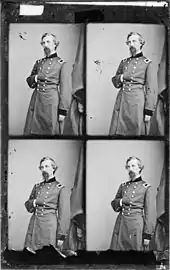George Foster Shepley (judge)
George Foster Shepley (January 1, 1819 – July 20, 1878) was an officer in the Union Army during the American Civil War, military governor of Louisiana and a United States circuit judge of the United States Circuit Courts for the First Circuit.
George Foster Shepley | |
|---|---|
 | |
| Judge of the United States Circuit Courts for the First Circuit | |
| In office December 22, 1869 – July 20, 1878 | |
| Appointed by | Ulysses S. Grant |
| Preceded by | Seat established by 16 Stat. 44 |
| Succeeded by | John Lowell |
| Military Governor of Richmond | |
| In office April 3, 1865 – July 3, 1865 | |
| Preceded by | Joseph C. Mayo (Mayor) |
| Succeeded by | David J. Saunders Sr. (Mayor) |
| 18th Governor of Louisiana | |
| In office July 2, 1862 – March 4, 1864 | |
| Preceded by | Thomas Overton Moore |
| Succeeded by | Michael Hahn |
| Mayor of New Orleans (acting) | |
| In office May 20, 1862 – July 11, 1862 | |
| Preceded by | John T. Monroe |
| Succeeded by | Godfrey Weitzel (acting) |
| Personal details | |
| Born | George Foster Shepley January 1, 1819 Saco, Maine |
| Died | July 20, 1878 (aged 59) Portland, Maine |
| Resting place | Evergreen Cemetery Portland, Maine |
| Education | Harvard University Dartmouth College (A.B.) read law |
Education and career

Born on January 1, 1819, in Saco, Maine,[1] Shepley attended Harvard University, received an Artium Baccalaureus degree in 1837 from Dartmouth College and read law in 1839.[1] He entered private practice in Bangor, Maine from 1839 to 1844.[1] He continued private practice in Portland, Maine from 1844 to 1861.[1] He served as the United States Attorney for the District of Maine from 1848 to 1849 and from 1853 to 1861.[1] He served as a Brigadier General in the United States Army during the American Civil War from 1861 to 1865.[1] He resumed private practice in Portland from 1865 to 1866.[1] He was a member of the Maine House of Representatives from 1866 to 1867.[1] He again resumed private practice in Portland from 1867 to 1869.[1]
Civil War service

Shepley was commissioned a Colonel of the 12th Maine Infantry on November 16, 1861.[2] He was assigned to the Department of the Gulf, commanding a brigade during the New Orleans campaign from April 18, 1862, to May 1, 1862.[2] He served as military governor of New Orleans, Louisiana from May 1862 to July 1862, and then served as military governor of the Union-occupied parishes of Louisiana until March 1864.[2] He was appointed Brigadier General of Volunteers on July 18, 1862.[2] He briefly headed a district in Virginia and then served as chief of staff of XXV Corps, in the Army of the James.[2] He then served as military governor of Richmond, Virginia from April 3, 1865, to July 1, 1865, when he resigned his military commission to return to private practice.[2]
Federal judicial service
Shepley was nominated by President Ulysses S. Grant on December 8, 1869, to the United States Circuit Courts for the First Circuit, to a new seat authorized by 16 Stat. 44.[1] He was confirmed by the United States Senate on December 22, 1869, and received his commission the same day.[1] His service terminated on July 20, 1878, due to his death in Portland.[1] He was interred at Evergreen Cemetery in Portland.[3] His tombstone has his birth date as January 1, 1819.[3]
References
- George Foster Shepley at the Biographical Directory of Federal Judges, a public domain publication of the Federal Judicial Center.
- Tucker, Spencer C. (2013). American Civil War: The Definitive Encyclopedia and Document Collection [6 volumes]: The Definitive Encyclopedia and Document Collection. ABC-CLIO. p. 1761. ISBN 9781851096824.
- Appleton's Cyclopedia "George Foster Shepley"
Sources
- State of Louisiana – Biography
- Cemetery Memorial by La-Cemeteries
- George Foster Shepley at the Biographical Directory of Federal Judges, a public domain publication of the Federal Judicial Center.
- "16 Stat. 44" (PDF). United States Congress. April 10, 1869 – via Wikimedia Commons.
External links
- "George Foster Shepley". Find a Grave. Retrieved 2008-10-13.
- George Foster Shepley Writ of Election at The Historic New Orleans Collection
